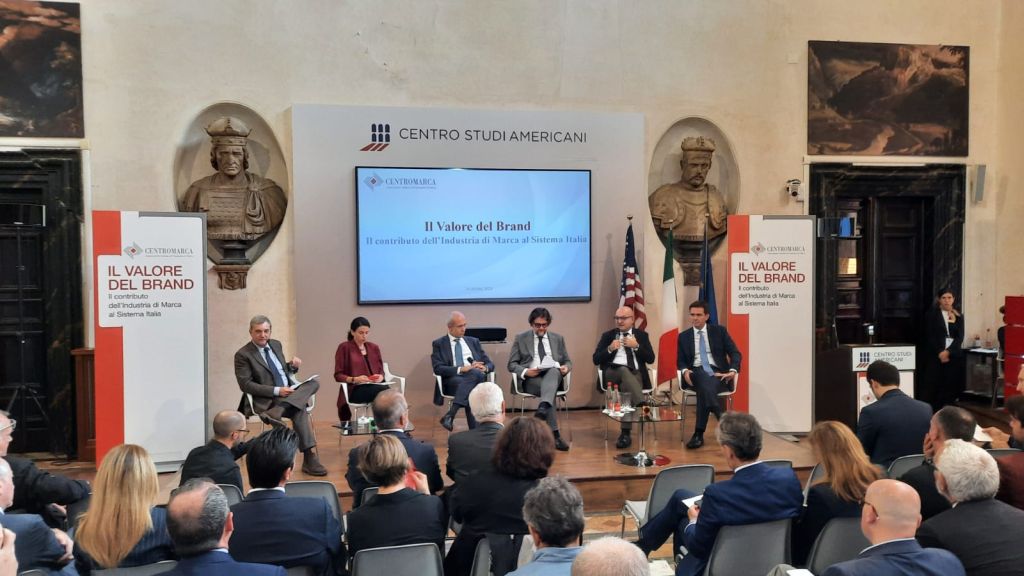ROME (ITALPRESS) – Centromarca’s member industries, among the most important active in the food, beverage and home/personal chemical sectors, confirm their strategic role in the country’s economic and social fabric. According to the evidence of the study La Marca crea valore per l’Italia (The Brand Creates Value for Italy), prepared by Althesys Strategic Consultants and presented today in Rome at the Centro Studi Americani, in 2023 they generated – upstream and downstream of their activities – Shared Value of 87.2 billion euros (equal to 4.2 percent of gross domestic product) with a growth of 19 percent compared to the 73 billion detected in 2019. “Brand identifies Italy and together they form an inseparable pair made of quality and creativity, beauty and well-made. A heritage that our country must protect and enhance. The value of Brand Industry goes beyond the simple, albeit considerable, economic contribution,” stresses Francesco Mutti, president of Centromarca. The Brand invests in sustainable innovation, research, growth of talents and skills, offers spin-offs on the territories, is a driver of investment attraction for the country system and is a leader of Made in Italy. The Brand Industry is an indispensable player in a sector, the FMCG sector, that represents a strategic supply chain for the country and calls for a serious industrial policy that brings greater efficiency to the system. “The Shared Value generated along the supply chain goes far beyond just the production phase, where Centromarca member companies operate, and arises from collaboration with national suppliers and distribution channels, with the overall spillovers being three times those from the industrial phase alone.The contribution to tax contribution is 28.7 billion euros (equal to 5 percent of 2023 tax revenue), of which 12.9 billion is attributable to VAT, 12.2 billion to labor taxes and social contributions, and 3.5 billion to corporate income taxes. Each worker in Centromarca industries contributes to the creation of 7.2 jobs in Italy, the equivalent of 1 million people (or 4.1 percent of the employed), of which 738,760 are in the FMCG supply chain: 72,056 among suppliers, 131,522 in production, 6,195 in logistics, and 528,987 in distribution and sales. In addition, member companies generate €26.6 billion in gross wages (up 17 percent compared to 2019), accounting for 3.2 percent of total employee income and 15.7 percent of manufacturing industry wages.In detail, the Shared Value created by the production activity of Centromarca members is €26.9 billion: €13.5 billion in Added Value, €9.1 billion in induced spillovers, €4.2 billion in VAT, and €100 million in donations. Another 13.9 billion in value is created by suppliers (raw materials, agriculture, livestock, packaging, machinery, etc.), 1 billion by logistics operators and 45.4 billion by trade channels (modern distribution, wholesale, traditional retail, out-of-home, etc.). “Without the Italian industrial production base,” explains Alessandro Marangoni, ceo of Althesys, “suppliers would not have sufficient markets and downstream products for marketing to consumers would be missing. Domestic production is therefore strategic, as, by the way, became clear during the 2020 lockdown, in which Centromarca member companies were decisive for our economic system and citizens. “To maintain this proactive role in the country,” Mutti says, “a regulatory framework that favors the dimensional growth of our industries and investments destined for research is indispensable. Equally priority are interventions to ensure compliance with the law and fair competition. We would like to focus our demands on measures at zero cost to the state coffers: we are thinking of interventions to simplify and streamline supply chain logistics, with a view to pushing digitalization. We are focusing Centromarca’s action on these areas at political-institutional tables, with the aim of strengthening the competitiveness of our companies in domestic and international markets. Obviously, we are opposed to any tightening of consumption taxes, which would further reduce the purchasing power of Italian families. “The work of the meeting was opened by Alessandro Morelli, Undersecretary of State at the Presidency of the Council of Ministers, Coordination of Economic Policy and Planning of Public Investments. The study’s evidence and Centromarca’s assessments were the subject of extensive reflections in a round table discussion, moderated by Giuseppe De Filippi, deputy director Tg5, which was attended, along with President Mutti: Alessandro Cattaneo, EU Policies Commission, House; Antonio Misiani, vice-president of the Budget Commission, Senate; Marco Osnato, president of the Finance Commission, House; and Giulia Pastorella, Transport Commission, House.
– photo xi2/Italpress -(ITALPRESS).

